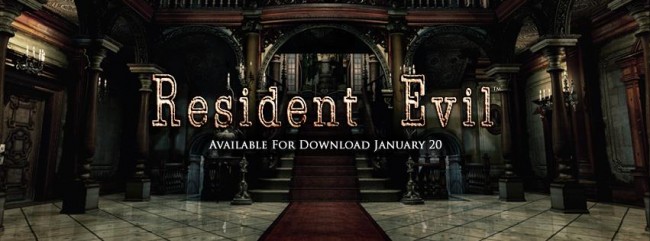
I should begin by stating that I never played the original Resident Evil (RE). You see, during the PSone era, I was a big fan of Silent Hill (as it’s what I got first), so naturally I feigned indifference toward the RE franchise for many years. Of course, that attitude didn’t last long as my passion for survival horror developed; eventually leading to my first love in the series: Code Veronica. Since that time, I’ve played RE:5 and Revelations; both of which were both enjoyable, albeit a tad average. I don’t think I fully appreciated the franchise until I reviewed RE:4 last year, though; which may be cliche, but it really is that good. In fact, I liked it so much that I immediately went out and bought RE:6… And, well, that still kind of stings. For clarity, I needed to look backwards, and this release could not have come at a better time.
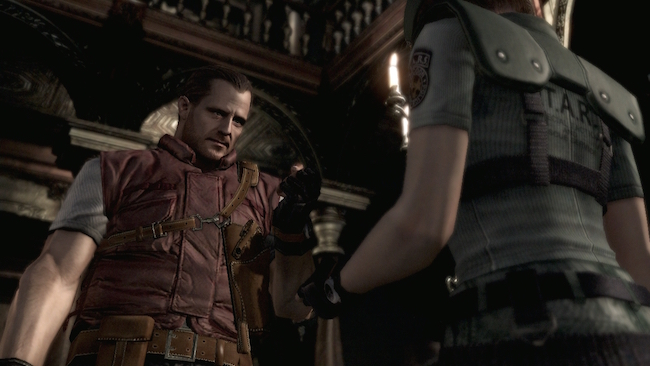
The story of Resident Evil begins on the outskirts of Racoon City, where there have been reports of bizarre murders and human cannibalism. The Raccoon Police Department’s Special Tactics and Rescue Service (S.T.A.R.S.) have been sent to investigate: first Bravo team, who lost contact shortly after arriving, and Alpha (your team) who were subsequently sent to investigate their disappearance. The way the game unfolds from this point depends on whether you select Chris or Jill: who offer variations to the main scenarios, as well as different strengths and abilities. There is also a new option to change the character models to their modern appearance, but it doesn’t quite feel right as the cutscenes are pre-rendered with the originals. For newcomers, I’d recommend playing as Jill for her larger inventory.
I absolutely love that the game opens with the words: “Enter the survival horror.” It’s immediately clear what this experience is meant to be, and yet, it was still difficult to decide on how to assess this game for 2015. I didn’t have any nostalgia to draw on for comparisons, and I wasn’t comfortable evaluating it by modern conventions. In the end, I referred to my experiences with Silent Hill (PS1) and Code Veronica (PS2) and examined the core design based on the standards of the genre during the mid-late ’90s. Furthermore, I also researched and evaluated the HD updates by what I think are reasonable “remastered” standards. You should also know that I adore the roots of survival horror, so it’s possible that some mechanics I praise could result in frustration for those inexperienced with this era of gaming.
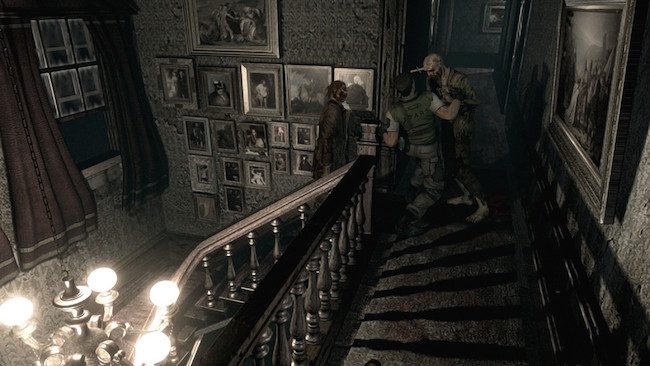
For reference, I played as both Jill & Chris for comparison, but my primary experience was with Mr. Redfield. For me, a core part of survival horror is isolation, and as fans of the game would know, Jill regularly teams up with Barry Burton (who I appreciate is a series favourite). It’s absolutely worth your time experiencing both, however. This was just my personal preference. Things with Chris are a little more challenging as no one will come to his rescue and six inventory slots forces you to really consider what you carry. It also doesn’t hurt that there is less dialogue on his route. While REmake’s voice over is vastly improved over the laughable original, conversations are still awkward by today’s standards. I do have some praise for the story, though; given the absence of cults and wildly convoluted conspiracies.
It’s a common trope to be a hero and save the world, but I feel as if that idea has grown tired. I really appreciated the confined setting of the mansion, and the focus the game puts on uncovering mysteries. Everything about the plot of the original Resident Evil just has a more pragmatic feel about it as opposed to the later entries in the series. You’re a member of S.T.A.R.S, you don’t know anything, and your only goal is to find answers and survive. What surprised me most was that this is not just a game about slow-walking zombies. There are so many larger than life ideas too, with many being based around giant scientific monstrosities: snakes, sharks, spiders and vicious plants. It’s far from the groaning cliche I had expected, and now I understand why RE:4 worked so well as it embraces a similar philosophy.
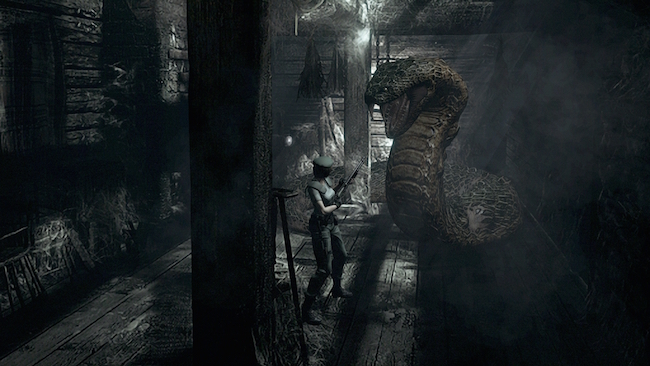
From today’s perspective, the mechanics do appear archaic: limited inventory slots, ink ribbons for saving, and fixed camera angles. In fact, Resident Evil is basically a game that revolves around collecting items to get more items, to unlock rooms to get to more rooms. That’s not to say this is a bad thing. In fact, it further highlights the potential for developing solid fundamental ideas. For example, a limited inventory and game saves forces the player to take their time and pre-plan, whereas nothing quite captures the anxiety of a fixed camera angle. It’s the same with the exploration, too. You always feel as if you’re doing something meaningful and reaching places you couldn’t before. It’s incredibly rewarding despite some frustration, and I hope that survival horror can revisit these strengths in better ways.
On the other hand, I believe ideas such as limited ammunition and not using objective waypoints are just as relevant today in survival horror. I really enjoyed the balancing of equipment and items as you progress, and how the game intelligently escalates what it throws at you. You learn by playing; an approach games such as Dark Souls have recaptured in recent years. Likewise, should you die, despite the initial frustration, you are guaranteed to pursue a better approach and regain lost progress quickly. You are also forced to learn your environment, map out the safest routes, and take note of where things are. The only help you get from the game is whether there are still items to be collected in a room or if a door is locked. It’s an intimate experience of discovery that waypoint markers destroy today.
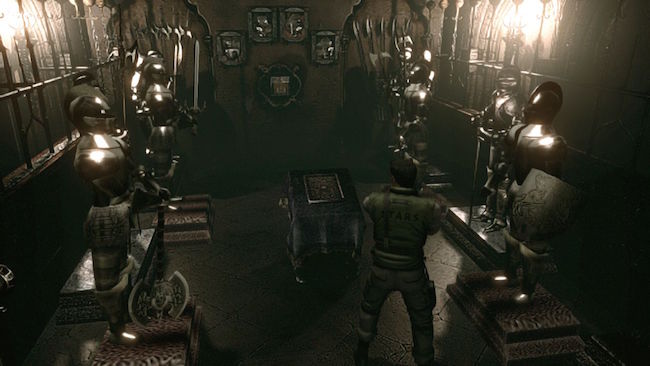
Having watched an hour of the original PSone version on YouTube, I have to admit that I’m incredibly impressed with what Capcom was able to achieve with “REmake.” What we’re looking at with the “HD Remaster” is by no means a jump of that scale, but given the digital release and price point, I do think it was a smart idea on their part. There were plenty of fans who missed it on GameCube; or, like me, didn’t play it at all. It’s a great opportunity, and the truth is that the game has never looked better. Updating can be risky with fans; especially in terms of how it plays. In this instance, the biggest changes are the addition of 16:9 widescreen and a more modern control scheme. As someone heavily familiar with 4:3 and tank controls, I can’t understate this simple improvement. I also appreciate that it’s optional, too.
In terms of the visual upgrades, the game has seen improvements across the board but with a minimalist approach. The textures and lighting are noticeably better, providing a much crisper environment; though, we’re mostly talking about upscaling as only a few select elements had to be recreated. I also can’t speak highly of the cutscenes as they’re still quite blurry in appearance. In fairness, this is not unexpected for a “remaster,” but I feel this release could have been more significant given additional development time. It also kind of bothered me that the menus didn’t receive a revamp, and while I appreciate the nostalgia of the door animations, an option to turn them off would have been nice. Personally, I felt 60FPS was easily the best upgrade of all, but, sadly, this option is only available on the PC.
 Holds up remarkably well for its age
Holds up remarkably well for its age
 A lot of great ideas that deserve revisiting
A lot of great ideas that deserve revisiting
 16:9 widescreen & new controls work great
16:9 widescreen & new controls work great
 Resident Evil has never looked better
Resident Evil has never looked better
 Reasonably priced with lots of replay value
Reasonably priced with lots of replay value
 The style isn’t going to be for everyone
The style isn’t going to be for everyone
 Remastering could have gone much further
Remastering could have gone much further
 60FPS is only available on the PC. Why?
60FPS is only available on the PC. Why?
Despite being a product of the ’90s, Resident Evil is just as much a paragon for survival horror as it’s ever been. It is confident in what it wants to be, which is arguably the quality that the franchise lacks today. Personally, I have a lot of respect for Shinji Mikami, and it’s remarkable just how undeterred this game is by archaic mechanics. There is a magic in the way it engages the player, which also makes it very easy to look past some weaker moments and monotonous design. I can’t say the “remastering” is outstanding, but it’s certainly the best version to date. Fortunately for Capcom, they did such an incredible job with the “REmake” that they didn’t have to do much to make the game feel relevant again. If you’re like me and hadn’t played it before, or just want to go back, there has never been a better opportunity.
EDITOR NOTE: this game was purchased at retail by the writer, and reviewed on PC across 10+ hours of gameplay. If you are interested in the game, and liked this review, you can support us by purchasing it through our store: HERE











